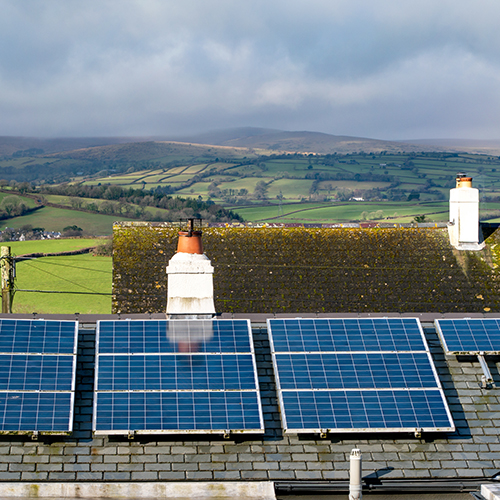
MARION JAMMET, Head of Policy & Advocacy, Irish Green Building Council, writes about how architects, engineers and builders can collaborate to overcome the challenge of delivering zero-carbon buildings and infrastructure.
The incorporation of efficiency requirements into the national building code, first introduced in the 1970s, means that typical homes constructed today consume half as much energy as homes built in the 1980s.
New homes designed and built to the current nearly zero energy building (NZEB) standard are highly energy efficient, and carbon modelling to 20301 shows that the standard, implemented alongside the decarbonisation of the grid and Ireland’s ambitious retrofit programme, should lead to a significant decrease in operational emissions in the next decade.
Yet, the emissions associated with the energy we need to heat, cool and light our buildings still account for a quarter of our national emissions, and the latest data from the EPA highlights the urgency to move faster in every sector. While increasing the depth and rate of energy renovation is critical to reaching our climate targets, it can also address dereliction and contributes to housing delivery as well as to improving public health 2; but it presents significant challenges. This article explores actions required to address these challenges and transition to zero-emission buildings.
ACCELERATING THE RENOVATION WAVE
Despite an increase in the number of energy renovations completed in 2022, the 2030 targets appear increasingly out of reach. The work completed to date by the Irish Green Building Council (IGBC) and its partners as part of the Build Up Skills Ireland (BUSI2030) project3 shows that labour shortages and a lack of appropriate skills at all levels of the design, construction and supply chain remains one of the most significant barriers to the successful delivery of our national renovation strategy. Interim findings indicate that in a “business as usual” scenario, the construction industry will need to recruit approximately 120,000 additional skilled construction workers and building professionals and to reskill the existing 164,000 workforce by 2030 to deliver on Ireland’s housing and climate targets. The results indicate in the years 2021 – 2023, 10 times more students opted for degree courses over craft apprenticeships, while construction and engineering courses still have a relatively low intake of students and a high dropout rate. In addition to actions to attract more people to the industry, promote diversity and incentivise upskilling, the interim report stresses the importance of better use of our existing stock, high-quality, large-scale renovations, and innovative methods of construction as key strategies to deliver much-needed homes without blowing Ireland’s carbon budget.
Echoing the concept of ‘sufficiency’ introduced in the proposed revision of the EU’s Energy Performance of Buildings Directive (EPBD), the report highlights that better use of our existing stock through high-quality energy renovations would ensure more effective use of a scarce workforce, financial and carbon resources.
Other barriers to energy renovation include a lack of awareness and access to finance. Many homeowners who may be interested in energy renovation simply do not know what to do and where to start.
To address this issue, the IGBC launched a register of energy renovation advisors, ie, specialist building professionals who have upskilled in energy renovation4. The objective of the register is to make it easier for homeowners to identify building professionals who have upskilled in the area while incentivising upskilling and ensuring quality control.
Energy renovation advisors have a crucial role to play in supporting the retrofit of more complex buildings (eg, traditionally built buildings) and could also support the development of renovation roadmaps.
The ‘renovation passport’ is a new concept in Europe and should be introduced across the continent on a voluntary basis by 2025 under the proposed revision of the EPBD. The idea is that the homeowner should get a clear plan to improve their home that they can implement over several years. If they don’t have the finances to complete all of the work at the same time, they can do it bit by bit in a way that works to the end goal of an energy-efficient and comfortable home.
TRANSITIONING TO NET ZERO BUILDINGS
As highlighted in the proposed revision of the EPBD, our industry will need to transition to the construction of zero-emissions buildings in the next decade.
To support this transition, the IGBC developed a draft definition of ‘Net Zero Carbon’. The definition covers both operational and embodied carbon emissions for the built environment. Key to Net Zero Carbon (NZC) buildings is the inclusion of performance targets as project KPIs from the earliest design stage and verified with as-built operational data via Post Occupancy Evaluation (POE).
The IGBC, in partnership with the Royal Institute of Architects of Ireland (RIAI), is now developing a ‘design for performance’ framework and CPD training for building professionals on delivering net-zero buildings in line with the RIAI’s 2030 Climate Challenge targets. This will support the transition from a ‘design for compliance’ to a ‘design for performance’ culture.
Post Occupancy Evaluation (POE) is the process of obtaining feedback on a building’s performance in use after it has been built and occupied. POE collects information on building and energy use and user satisfaction. It is a key element of the transition to design for performance culture, as disclosing actual performance will be essential to establish benchmarks and appropriate targets, as well as improving operational energy use over time.
POE is already included as an indicator in the Home Performance Index (HPI), Ireland’s national residential sustainability certification.
Coady Architects recently completed POE on Kilbride Court, a low-rise residential development, achieved Gold standard HPI certification. When it came to operational energy, the development’s metered values were almost triple that of RIAI 2030 Climate Challenge targets. This is primarily because the operational energy targets of the RIAI 2030 Climate Challenge include both regulated and unregulated loads. It should be noted that unregulated loads are outside of the designer’s scope or control. This example shows the road to design for performance will be challenging but also that disclosure across the industry is a critical step in this journey.
Delivering net zero carbon buildings at scale will be challenging and will require extensive cooperation, as well as upskilling in the industry. The recent Energy Ireland Irish Retrofitting Conference, at which IGBC presented, highlighted that energy efficiency requires teamwork, as collaboration is vital to success. Taking a holistic approach to emissions associated with the built environment is the cheapest and most effective way to address the challenge. Our homes do not only need to be highly energy efficient and decarbonised; how we build them impacts our industrial emissions from the production of construction materials, while where we build impacts our transport emissions.
BETTER HOMES 2023 CONFERENCE
These broader topics will be fully explored at IGBC’s annual residential conference, ‘Better Homes 2023’, which will take place on 01 December in Dublin. Speakers will discuss the importance of POE and the carbon impact of various types of new residential development, as well as what is needed to deliver climate-change-proof homes.
For more details on the Better Homes 2023 conference and to stay updated on the event, visit www.igbc.ie/events/better-homes-2023/
Footnotes
1 See Kinnane (2023). Whole Life Carbon In Construction and in the Built Environment in Ireland. Available at www.igbc.ie.
2 According to Velux’s latest healthy homes barometer, 24% of the Irish population is exposed to an indoor climate hazard, such as damp or excess cold. Living in a home that is too cold in winter is the most damaging building deficiency from a health perspective, and the positive effects of housing warmth on respiratory health and wellbeing among both children and adults are a consistent finding in research.
3 Build Up Skills Ireland 2030 is a national project funded by the European Commission to analyse the current and future skill gaps in sustainable construction and create a roadmap to ensuring these skills needs are met so that Ireland can achieve its national objectives regarding housing, retrofitting and the decarbonisation of its built environment. The project partners are CIF, IGBC, Laois Offaly Education and Training Board, and the Technological University of the Shannon.
4 The register is available at www.igbc.ie/ energy-renovation-advisors-register
About the Building A Zero Carbon Ireland Roadmap
The Building a Zero Carbon Ireland roadmap was developed by the IGBC in close cooperation with over 200 key stakeholders from industry, academia and the public sector as part of #BuildingLife – a programme funded by IKEA and Laudes foundations. Training and tools have been developed by the IGBC to support you in your transition to net zero. These include the Carbon Designer Tool, a simple way to estimate the carbon impact of your project at an early stage of building design, which was developed with support from the EPA and the LDA.
The Roadmap is available to download at https://www.igbc.ie/building-a-zero-carbon-ireland/





